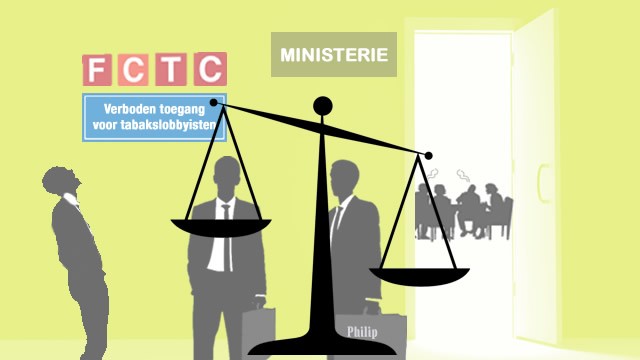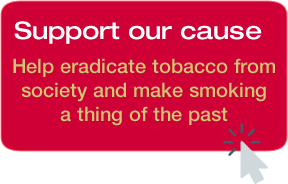Lung specialists take Dutch government to court
Dutch government sued for illegal contacts with tobacco industry
8 September 2014

The Youth Smoking Prevention Foundation, founded by Dutch lung specialists Pauline Dekker and Wanda de Kanter, is taking the Kingdom of the Netherlands to court to end the structural and excessive influence exerted by the tobacco lobby on government anti-smoking policies.
The Foundation is calling on the Dutch government to comply fully with the anti-smoking convention (WHO FCTC), which it signed and which is therefore legally binding. One of the most important articles in the convention states that every form of influence by the tobacco industry on policies to deter smoking must be avoided. In the court summons issued, the Foundation offers dozens of examples that show how the government has systematically violated this provision, and even invites the tobacco industry to clarify its position on matters of policy development.
20,000 tobacco-related deaths
More than 20,000 Dutch people, half of them younger than 65, die each year as a result of smoking. In addition, an average of 120 children under the age of 18 start smoking every day. Some 60 of them will continue to smoke for the rest of their lives, and 30 of them will die prematurely from the effects of smoking.
Smoking is by far the biggest cause of death that could be avoided through prevention. However, the marketing techniques deployed by the tobacco industry are so refined that many youths cannot resist the temptation to start smoking. Moreover, cigarettes are designed to be highly addictive. Children who start smoking end up addicted within weeks. For many of them, the question of 'free will' no longer applies: they are unable to stop smoking without help.
Numerous national and international laws and conventions make it a duty of the Dutch government to protect the health of its citizens from a serious cause of illness like tobacco. With as many as 20,000 tobacco deaths every year, the government has an obligation to do all in its power to combat the massive scale of premature fatalities. And it should certainly prevent minors from starting to smoke, because almost nobody starts after they turn 18.
Despite all this, the Dutch government has failed to implement measures that could be very effective in achieving results: imposing much higher taxes on tobacco and greatly reducing the current number of over 60,000 points of sale. Instead, the government listens to the tobacco industry, whose effective lobbying continues to successfully obstruct measures to discourage tobacco use. The latter issue is central to the court case.
FCTC convention
The summons focuses on the fact that the government still allows the tobacco lobby to influence the implementation of policies aimed at deterring tobacco use. Allowing such influence is a flagrant violation of the provisions of the legally binding international convention drawn up by the World Health Organization – the Framework Convention on Tobacco Control (FCTC) – signed and ratified by the Netherlands and 179 other countries.
Article 5.3 of the FCTC convention states that signatories must protect the setting and implementing of their tobacco deterrent policies from any influence from the tobacco industry. By citing the Freedom of Information Act, the Youth Smoking Prevention Foundation has obtained hundreds of documents that reveal how the government has maintained frequent contacts in various ways with representatives of the tobacco industry concerning many aspects of tobacco deterrent policies.
Influence on policy
The released documents show that representatives of tobacco manufacturers sometimes obtained confidential files on anti-smoking measures before they were handed to the minister or parliament. The correspondence reveals that the government gives the tobacco sector a say in important policy matters on smoking. The Ministry of Finance even engages in "regular consultation" with the tobacco sector once or twice a year to discuss not only matters of implementation but also substantive issues. The latter is exactly what the FCTC convention seeks to prevent.
It turns out that the tobacco sector not only offers unsolicited advice but is also invited directly by public officials to comment on draft legislation and laws. Officials also attended events organized by the tobacco industry, such as a congress that discussed the "danger" of high sales tax, which would encourage smuggling.
In short, the tobacco industry enjoys a permanent position as a partner of the Dutch government. "Introductory meetings" are also organized regularly so that lobbyists and/or employees from the tobacco industry can make the acquaintance of government officials and vice versa. Such occasions encompass more that introductions alone and touch on substantive issues.
The documents also reveal occasional consultation by telephone, as is made clear by email correspondence between officials from the Ministry of Health. "Van Kesteren from the Confederation of Netherlands Industry and Employers (VNO-NCW) called me on the phone," wrote one official. Van Kesteren is the director of this very powerful Dutch employers' organization. He phoned to convey the concerns of tobacco manufacturers, who are also members of the VNO-NCW, about forthcoming European anti-smoking measures. The manufacturers complained that they did not yet know how the ministry planned to respond to the proposals.
Van Kesteren was reassured. "I told him," the ministry official emailed his colleague, "that we had actually just agreed to meet those guys now and again to make the international agenda transparent, to enable them to provide input, and to give them a better understanding of our commitment."
The Youth Smoking Prevention Foundation has further evidence that the tobacco sector in the Netherlands has had an influence on, among other things:
– Implementation of European Council Directive on Tobacco Excise Duty 2010/12/EU. This directive is aimed at harmonizing tobacco excise duty within the European Union.
– Domestic policy on excise duty applied on tobacco. The tobacco sector is even allowed to help decide the level of excise duty applied. An example: On 15 March 2012 the then State Secretary for Finance, Frans Weekers, met with representatives of the tobacco sector. Among the issues they talked about was the "Excise Duty Paper 2013", which set the level of excise duty. The sector had previously made proposals to structure excise duty levels for a long period.
On 6 April the State Secretary thanked participants for their input:
"Last year I noted with interest the entire tobacco industry's views on a long-term structure for excise duty. [...] The various elements in the plan put forward by the sector have been taken on board in the Excise Duty Paper. [...] However, before this can be submitted (to parliament, ed.), I want to discuss the main features of the paper in a formal meeting with the tobacco sector."
– Amendments to the system of calculating sales tax on tobacco products. On 18 January 2013 the tobacco sector received a draft of a ministry regulation that the State Secretary had not yet approved. The official who sent the document wrote:
"As agreed, please find enclosed the draft version of the regulation. This is a confidential first draft and is fully subject to approval through the official channels and by the State Secretary." He requested that recipients "treat this version confidentially and not distribute it further without our permission." And: "We would like to receive your prompt response to this regulation on account of its speed expected by everybody. This will allow us to process your remarks and move on to informing stakeholders on time."
– The development of directives from the FCTC convention itself. In 2013 the Ministry of Finance invited representatives from the tobacco sector to provide input for the interpretation of Article 6 of the FCTC convention. Article 6 states that participating states should take price and tax measures to reduce demand for tobacco consumption. The further interpretation of Article 6 is set jointly by the convention partners in directives agreed during the two-yearly Conference of Parties (COP).
The Netherlands also provided input and, to that end, consulted with....the tobacco sector. In an e-mail dated 17 July 2013, a policy official at the Ministry of Finance wrote to a representative of the tobacco sector: "When the COP6 conference approaches, we kindly request your comments [concerning Article 6, ed.] (and those of the other partners in the sector). In the fall [2013, ed.] another meeting is scheduled between the Ministry of Finance and the tobacco industry. The development of the directives with regard to Article 6 FCTC will be on the agenda. During this meeting we will of course also have an opportunity to get to know one another."
– The European Tobacco Products Directive (TPD). The State Secretary for Health allowed the tobacco sector to submit written input concerning the government's position on anti-smoking proposals from Brussels before the position was made known to parliament. This is revealed by, among others, an email in December 2012 from the Ministry of Health to a senior figure at Philip Morris: "I am emailing you about the proposal from the Commission to amend the tobacco products directive [...] With regard to this, I request that you email me any comments you may have concerning this proposal."
Demands
With this court summons, the Youth Smoking Prevention Foundation wants to prove that the Dutch government is acting illegally by not complying with the WHO FCTC convention. The Foundation is also demanding that the government immediately break off all contact with representatives of the tobacco industry and that it inform all government agencies, including those at local government level, not to consult with the tobacco industry. In light of the FCTC convention, there is no longer any room for 'negotiation' with the tobacco industry. The government must do what it is obliged to do: protect its citizens from products that pose a serious threat to their health. In addition, the government should not be obstructed in those efforts as a result of consultation with the very companies that put those lethal products on the market.
The text of the court summons (in Dutch) can be found here
For more information on the Youth Smoking Prevention Foundation see the publication 'Steadfast in action for a smoke-free country'





 Rookpreventie Jeugd is registered as a Public Benefit Organisation.
Rookpreventie Jeugd is registered as a Public Benefit Organisation.